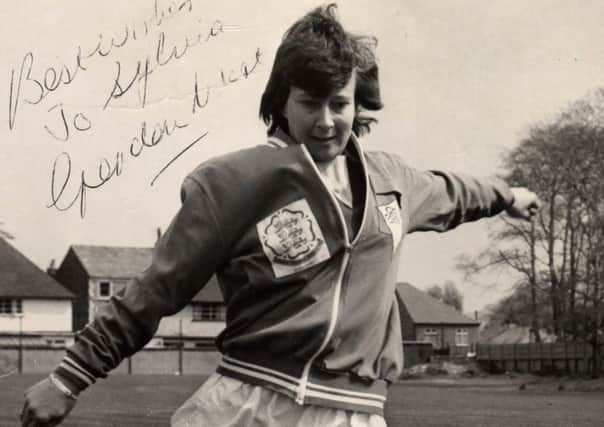Obituary: Sylvia Gore, women's football pioneer


S ylvia Gore made history when she scored England’s first official international goal in a 3-2 victory over fierce rivals Scotland in 1972. In a career spanning 60 years, Sylvia Gore was dubbed “the Denis Law of women’s football” after scoring an incredible 134 goals in a single season. The similarity with her contemporary in the men’s game was attributed to both her playing style and her instinct for the goal.
England’s first international was played on a cold, freezing, windswept day at Greenock, when almost all of the men’s fixtures had been cancelled due to the severe weather. Earlier that year, Gore had paid about £2,000 to go through a series of national trials for the first England team, before being accepted. England were trailing 2-0 to Scotland when, Gore later recalled, “I picked up the ball in my own area and ran 40 yards… I thought I would slip over, but I stayed on my feet and didn’t realise that I’d hit the ball past the keeper with the outside of my right foot in conditions like that.”
Advertisement
Hide AdAdvertisement
Hide AdIn England, the midfielder’s crowning moment came when her club, Fodens, ended the all-conquering Southampton Ladies’ three-year domination of the FA Cup, beating them 2-1 in the 1974 final.
At the age of 35, Gore’s career was ended after a severe back injury, but her exuberance and enthusiasm for the game were not extinguished and she went on to coach and manage at the highest level while continuing to promote the women’s game as an ambassador.
Born in Prescot (then in Lancashire, now in Merseyside), Sylvia Margaret Gore was the daughter of Eileen and John. Educated locally at Our Lady’s Junior School and St Edmund Arrowsmith Secondary School, she started kicking a ball at the age of four but grew- up in an era when opportunities for girls to play football were few and far between.
Despite her head teacher vetoing any participation in the school team, she was spurred on in the sport by her father and uncle, both of whom played with Prescot Cables Football Club. Aged 12, she was offered a place at Manchester Corinthians, which she gleefully accepted. She then spent her teenage years taking two buses, accompanied by her parents, to travel to and from matches.
Gore’s passion for the game was highlighted when, in a non-professional era, she gave up her “unappealing” office job to take part in an overseas charity tour with Corinthians at a time when the Football Association had banned female players from all its pitches; she revelled in travelling the world and playing football on proper pitches in front of tens of thousands .
Upon returning, Gore and women like her played on anything they could, changing in huts, using buckets of freezing water or simply jumping into nearby ponds to wash after matches. Finally, in 1969 the Women’s FA was established and two years later lobbying lead to the lifting of the FA ban.
In 1967, Gore joined Fodens, originally a works team from the Edwin Foden, Sons & Co lorry manufacturing plant in Sandbach, Cheshire, helping them win the FA Cup.
Upon retiring from playing, Gore managed the Wales International women’s team, 1982-89, and acted as secretary to Liverpool FC Ladies, while continuing to coach and encourage a new generation of women across the north-west, in addition to serving as women’s football development officer for Knowsley Council over three decades. She was also part of the Women’s FA, which organised and ran women’s football in England before the FA took over in 1993, after which she sat on the FA’s Women’s Committee for 20 years before then serving as a delegate for the Women’s Super League, launched in 2011. In 2014, Gore became the first female director of the Liverpool County FA.
Advertisement
Hide AdAdvertisement
Hide AdIn 1999, she won a special achievement award at the inaugural FA Women’s Awards and was awarded an MBE for services to the game in 2000, the same year she was honoured by UEFA in Monte Carlo. In 2014, Gore was inducted into the National Football Museum Hall of Fame alongside such stars of the men’s game as Sir Bobby Charlton, Sir Trevor Brooking and Alan Shearer.
In March 2016 Manchester City Women named Gore their club ambassador.
FA director Kelly Simmons said: “Sylvia was an absolute pioneer for women’s football in this country and without her the game wouldn’t be in the position it is today”
Gore died from cancer after a short illness and is survived by a number of cousins.
MARTIN CHILDS